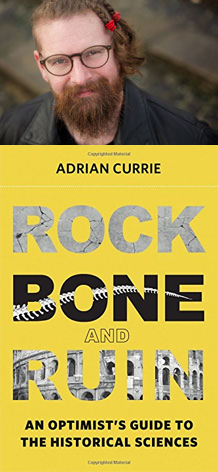
In this book Adrian Currie develops an original philosophical approach to the historical sciences.
Adrian Currie wins the 2019 Fernando Gil Prize for Philosophy of Science
Adrian Currie’s Rock, Bone and Ruin: An Optimist’s Guide to the Historical Sciences is a systematic philosophical examination of how scientists generate knowledge of the deep past.
The jury felt this met the highest standards for an outstanding single-authored book in the philosophy of science and judged it to be therefore a worthy winner of the Fernando Gil prize for 2019.
They said:
‘Adrian develops an original philosophical approach to the historical sciences. Such bodies of knowledge are built from slight and contingent traces of the past, and pessimistic minds would deem this basis insufficient for eliciting significant explanations and making sense of the unwitnessed entities and events of the past world.
But paleontologists, geologists and archeologists have been remarkably creative: they have optimistically found means for yielding successful models and methods and adapting them to the multi-conditional rendering of the relevant data.
In his analyses, Adrian Currie points to the fact that the conceptual apparatus of present-day philosophy of science, essentially developed to account for the hard natural sciences and their modes of development, falls short of meeting the challenge of enlightening the ways and means by which historians provide adequate reasons for paleontological realities and the like. The manner in which they rationally rehearse and reconstitute the data they build from, affords a coherent probabilistic understanding of a world which has survived only through the material signs they decipher.
Adrian’s book is a magnificent attempt at providing the pragmatic, reasonable and efficient elements of an epistemology that can successfully interpret how human reason breeds explanations in the historical sciences.’
Adrian Currie is a Lecturer of Philosophy in the Department of Sociology, Philosophy and Anthropology at the University of Exeter. He is also a member of Egenis (the Centre of the Life Sciences at Exeter.
